
(Didelphimorphia)
Opossums
Опосумові
Opossums are members of the marsupial order Didelphimorphia endemic to the Americas. The largest order of marsupials in the Western Hemisphere, it comprises 126 species in 18 genera. Opossums originated in South America and entered North America in the Great American Interchange following the connection of North and South America in the late Cenozoic.
As marsupials, female opossums have a reproductive system that includes a bifurcated vagina and a divided uterus; many have a pouch. The average estrous cycle of the Virginia opossum is about 28 days. Opossums do possess a placenta, but it is short-lived, simple in structure, and, unlike that of placental mammals, not fully functional. The young are therefore born at a very early stage, although the gestation period is similar to that of many other small marsupials, at only 12 to 14 days. They give birth to litters of up to 20 young. Once born, the offspring must find their way into the marsupium, if present, to hold on to and nurse from a teat. Baby opossums, like their Australian cousins, are called joeys. Female opossums often give birth to very large numbers of young, most of which fail to attach to a teat, although as many as 13 young can attach, and therefore survive, depending on species. The young are weaned between 70 and 125 days, when they detach from the teat and leave the pouch. The opossum lifespan is unusually short for a mammal of its size, usually only one to two years in the wild and as long as four or more years in captivity. Senescence is rapid. Opossums are moderately sexually dimorphic with males usually being larger, heavier, and having larger canines than females. The largest difference between the opossum and non-marsupial mammals is the bifurcated penis of the male and bifurcated vagina of the female. Opossum spermatozoa exhibit sperm-pairing, forming conjugate pairs in the epididymis. This may ensure that flagella movement can be accurately coordinated for maximal motility. Conjugate pairs dissociate into separate spermatozoa before fertilization.
Behavior
Opossums are usually solitary and nomadic, staying in one area as long as food and water are easily available. Some families will group together in ready-made burrows or even under houses. Though they will temporarily occupy abandoned burrows, they do not dig or put much effort into building their own. As nocturnal animals, they favor dark, secure areas. These areas may be below ground or above.
When threatened or harmed, they will “play possum”, mimicking the appearance and smell of a sick or dead animal. This physiological response is involuntary (like fainting), rather than a conscious act. In the case of baby opossums, however, the brain does not always react this way at the appropriate moment, and therefore they often fail to “play dead” when threatened. When an opossum is “playing possum”, the animal’s lips are drawn back, the teeth are bared, saliva foams around the mouth, the eyes close or half-close, and a foul-smelling fluid is secreted from the anal glands. The stiff, curled form can be prodded, turned over, and even carried away without reaction. The animal will typically regain consciousness after a period of a few minutes to four hours, a process that begins with a slight twitching of the ears.
Some species of opossums have prehensile tails, although dangling by the tail is more common among juveniles. An opossum may also use its tail as a brace and a fifth limb when climbing. The tail is occasionally used as a grip to carry bunches of leaves or bedding materials to the nest. A mother will sometimes carry her young upon her back, where they will cling tightly even when she is climbing or running.
Threatened opossums (especially males) will growl deeply, raising their pitch as the threat becomes more urgent. Males make a clicking “smack” noise out of the side of their mouths as they wander in search of a mate, and females will sometimes repeat the sound in return. When separated or distressed, baby opossums will make a sneezing noise to signal their mother. The mother in return makes a clicking sound and waits for the baby to find her. If threatened, the baby will open its mouth and quietly hiss until the threat is gone.
Diet
Opossums eat insects, rodents, birds, eggs, frogs, plants, fruits and grain. Some species may eat the skeletal remains of rodents and roadkill animals to fulfill their calcium requirements. In captivity, opossums will eat practically anything including dog and cat food, livestock fodder and discarded human food scraps and waste.
Many large opossums (Didelphini) are immune to the venom of rattlesnakes and pit vipers (Crotalinae) and regularly prey upon these snakes. This adaptation seems to be unique to the Didelphini, as their closest relative, the brown four-eyed opossum, is not immune to snake venom. Similar adaptations are seen in other small predatory mammals such as mongooses and hedgehogs.
Habitat
Opossums are found in North, Central, and South America. The Virginia opossum lives in regions as far north as Canada and as far south as Central America, while other types of opossums only inhabit countries south of the United States. The Virginia opossum can often be found in wooded areas, though its habitat may vary widely. Opossums are generally found in areas like forests, shrubland, mangrove swamps, rainforests and eucalyptus forests. Opossums have been found moving northward.
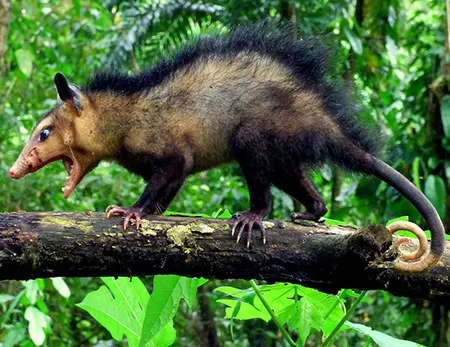
(Didelphis marsupialis)
Common Opossum
Опосум звичайний
It lives from the north-eastern Mexico to Bolivia (reaching the coast of the South Pacific Ocean to the central coast of Peru), including Trinidad and Tobago and the Windwards in the Caribbean.
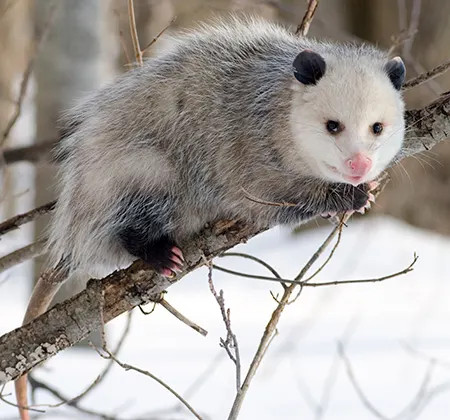
(Didelphis virginiana)
Virginia Opossum
Опосум віргінський
Is found from southern Canada to northern Costa Rica (making it the northernmost marsupial in the world).
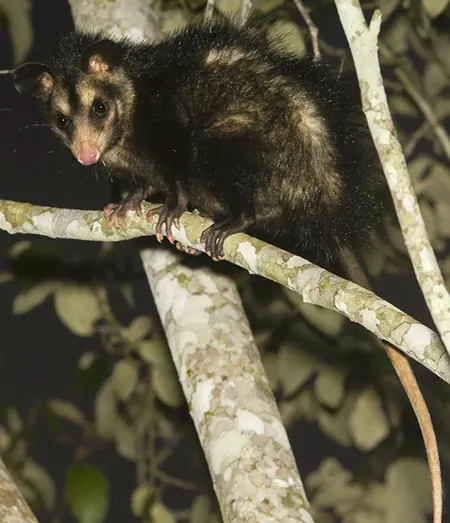
(Didelphis aurita)
Big-eared Opossum
Опосум вухатий
Native to South America. It is found in Argentina, Brazil and Paraguay.
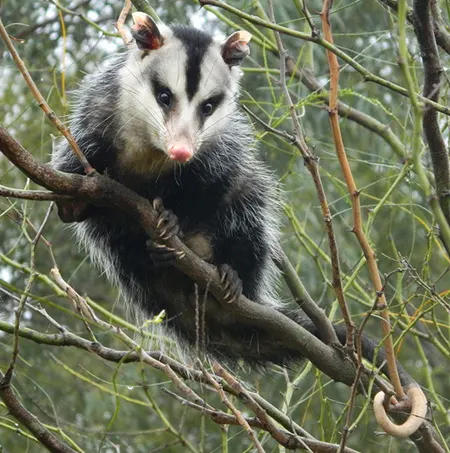
(Didelphis albiventris)
White-eared Opossum
Опосум біловухий
It inhabits open areas, mountains, and deciduous forests and are commonly found in Argentina, Paraguay, Uruguay, Bolivia, Brazil, the Andes, and humid forests of Guyana, Suriname, and southern Venezuela.
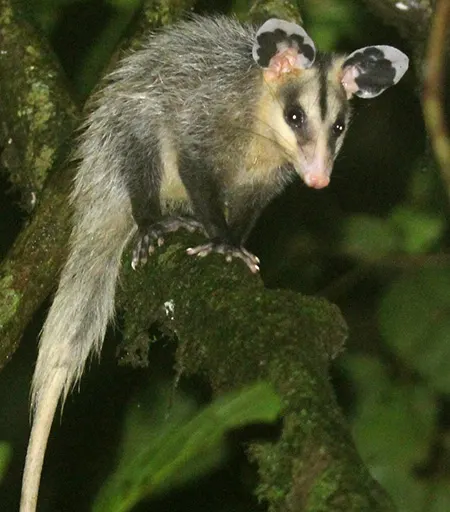
(Didelphis imperfecta)
Guianan White-eared Opossum
Гвіанський біловухий опосум
Native to South America. It is found in Brazil, Venezuela, Guyana, Suriname, and French Guiana.
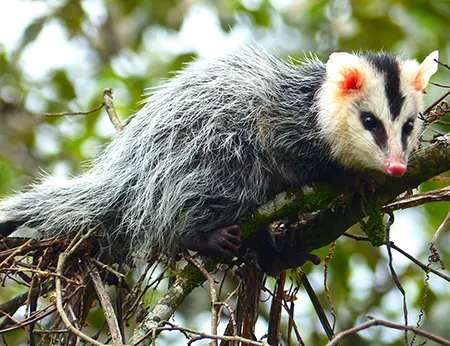
(Didelphis pernigra)
Andean White-eared Opossum
Андський біловухий опосум
Native to South America. It is found in the Andes Mountains, ranging from Venezuela to Bolivia.
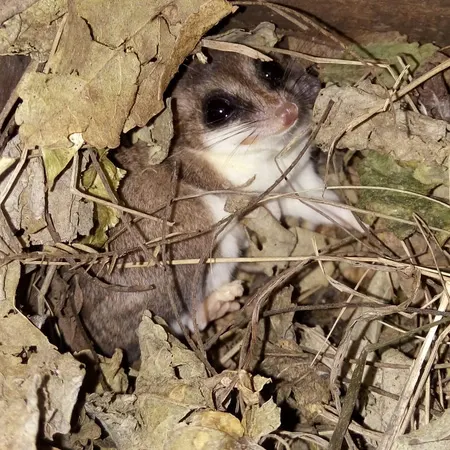
(Chacodelphys formosa)
Chacoan Pygmy Opossum
Чакський карликовий опосум
It is endemic to a small region in the Chaco of Formosa Province, northern Argentina.
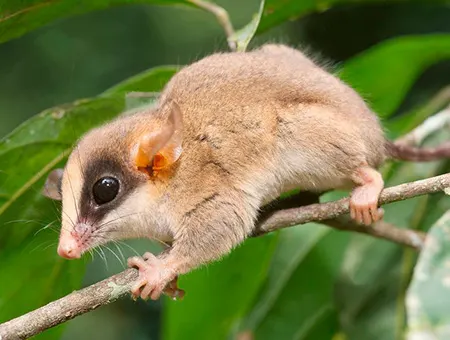
(Hyladelphys kalinowskii)
Kalinowski's Mouse Opossum
Опосум Каліновського
It is found in Brazil, French Guiana, Guyana, and Peru. Its natural habitat is subtropical or tropical moist lowland forests at elevations up to 1,000 m.
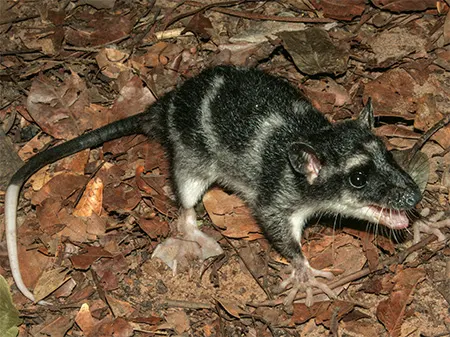
(Chironectes minimus)
Water Opossum
Водяний опосум
This semi-aquatic creature is found in and near freshwater streams and lakes from Mexico through Central and South America to Argentina.
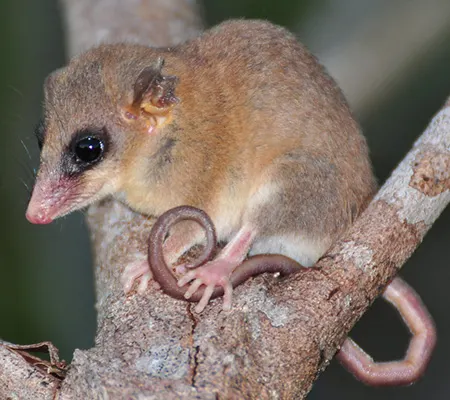
(Cryptonanus agricolai)
Agricola's Gracile Opossum
Опосум Агріколи
Endemic to eastern Brazil. Its habitat is the caatinga and cerrado.
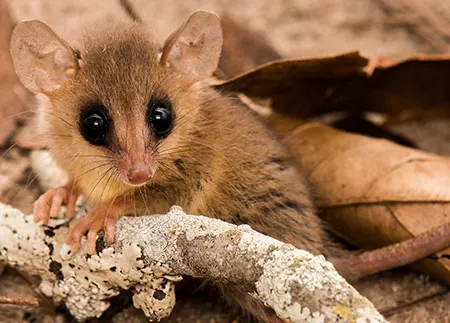
(Cryptonanus chacoensis)
Chacoan Gracile Opossum
Чакський граціозний опосум
It is native to Argentina, Brazil and Paraguay. Its habitat is seasonally flooded grasslands and forests in and near the Gran Chaco.
The genus (Cryptonanus) also includes: Guahiba Gracile Opossum (Cryptonanus guahybae), Unduavi Gracile Opossum (Cryptonanus unduaviensis).
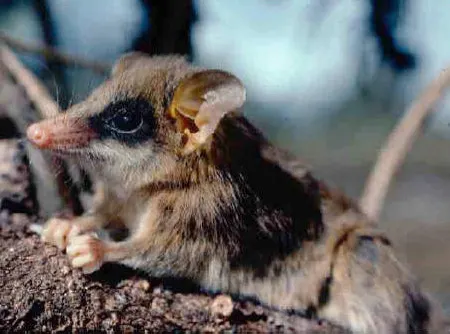
(Gracilinanus aceramarcae)
Aceramarca Gracile Opossum
Ацерамарський граціозний опосум
It is native to Bolivia and Peru, where it occurs in tropical elfin forest habitat.
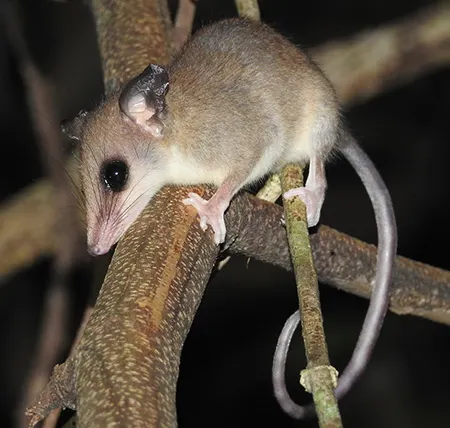
(Gracilinanus peruanus)
Peruvian opossum
Перуанський опосум
It is found only in eastern Peru, central and northern Bolivia, and west-central Brazil.
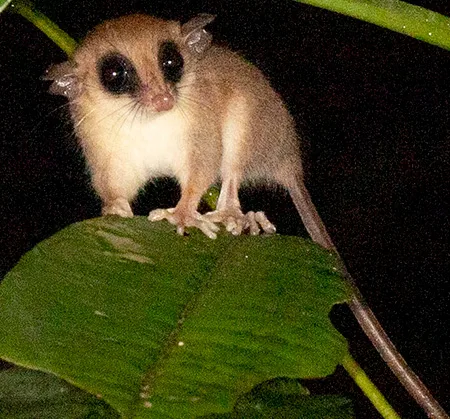
(Gracilinanus emiliae)
Emilia's Gracile Opossum
Граціозний опосум Емілії
It is found in Brazil, Colombia, French Guiana, Suriname.
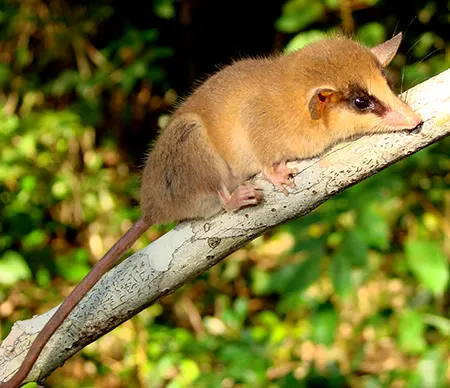
(Gracilinanus microtarsus)
Brazilian Gracile Opossum
Бразильський граціозний опосум
Is found only in Brazil, being endemic to the south-eastern parts of the country, from Espirito Santo to Rio Grande do Sul.
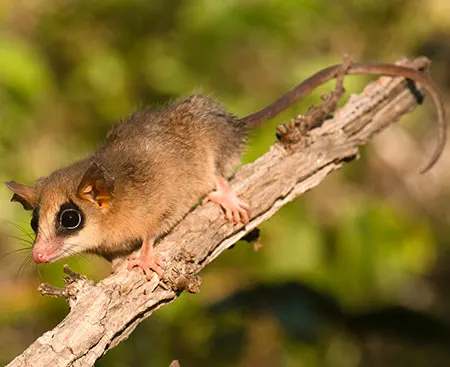
(Gracilinanus agilis)
Agile Gracile Opossum
Спритний граціозний опосум
It is native to Argentina, Bolivia, Brazil, Colombia, Peru, Paraguay, and Uruguay. Found in evergreen and gallery forests.
The genus (Gracilinanus) also includes: Wood Sprite Gracile Opossum (Gracilinanus dryas), Northern Gracile Opossum (Gracilinanus marica).
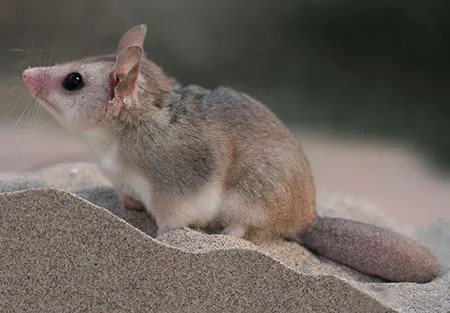
(Lestodelphys halli)
Patagonian Opossum
Патагонський опосум
It is found only in southern Argentina. There are two areas in the Patagonian steppe where these animals are often found: the province of La Pampa and Choele Choel (northern Rio Negro Province).
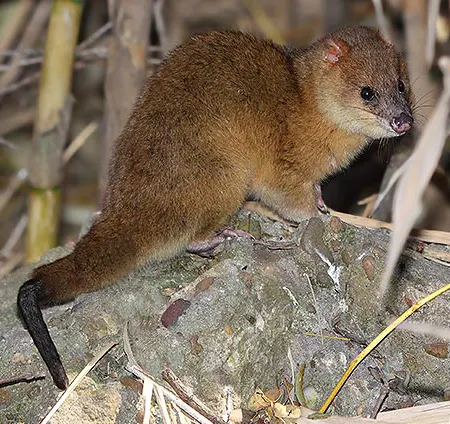
(Lutreolina crassicaudata)
Lutrine Opossum
Товстохвостий опосум
It is distributed in Brazil, Argentina, Bolivia, Uruguay, Paraguay, Colombia and Guyana. It generally lives near water and is active at night, dawn or dusk.
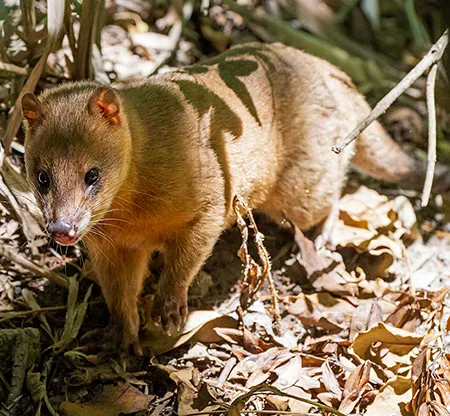
(Lutreolina massoia)
Massoia's Lutrine Opossum
Опосум Массої
It ranges from south-central Bolivia south to northern Argentina, where it is restricted to the Yungas region just east of the Andes. It has being found primarily in lowland savanna grasslands.
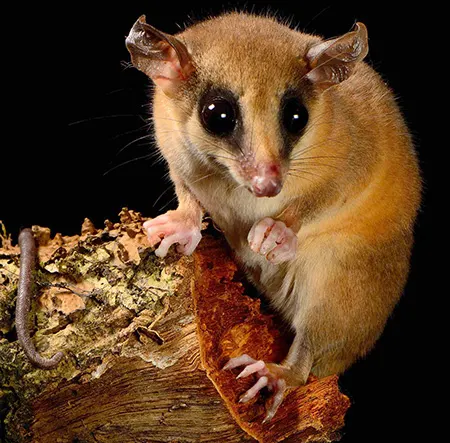
(Marmosa mexicana)
Mexican Mouse Opossum
Мексиканський мишачий опосум
It is found in Belize, Costa Rica, El Salvador, Guatemala, Honduras, eastern Mexico as far north as Tamaulipas, Nicaragua, and western Panama at elevations from sea level up to 3000 m; most commonly, it is found below 1800 m.
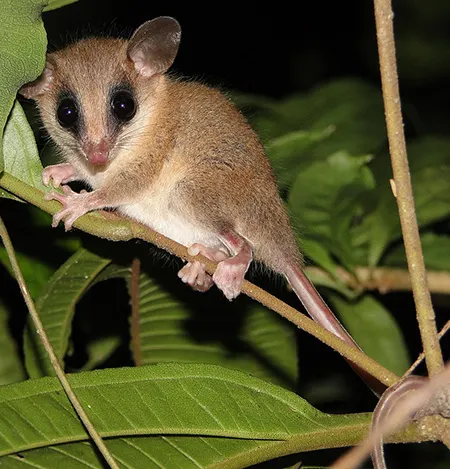
(Marmosa murina)
Linnaeus's Mouse Opossum
Мишачий опосум Ліннея
Its range includes Colombia, Mexico, Venezuela, Trinidad and Tobago, Guyana, Suriname, French Guiana, Brazil, eastern Ecuador, eastern Peru, and eastern Bolivia.
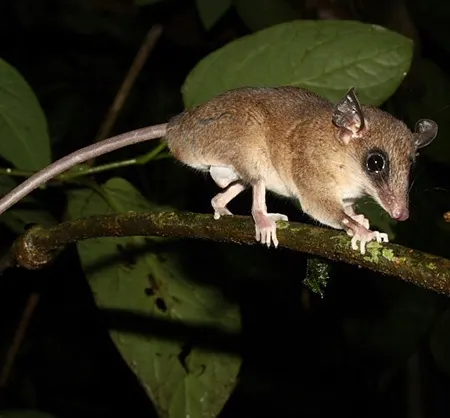
(Marmosa lepida)
Rufous Mouse Opossum
Рудий мишачий опосум
It has been found in Bolivia, French Guinea, Brazil, Colombia, Ecuador, Guyana, Peru and Suriname in lowland tropical rainforest at altitudes from 100 to 1,000 m.
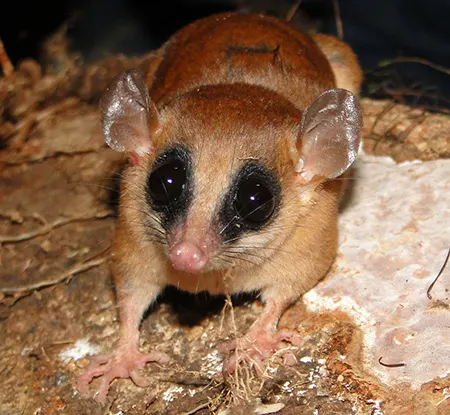
(Marmosa rubra)
Red Mouse Opossum
Червоний мишачий опосум
Its range includes eastern Ecuador and Peru.
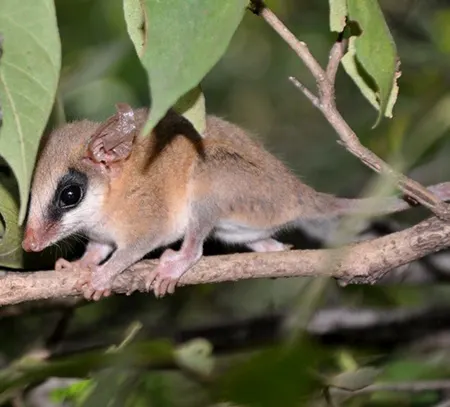
(Marmosa xerophila)
Guajira Mouse Opossum
Гуахірський мишачий опосум
It is found in Colombia and Venezuela.
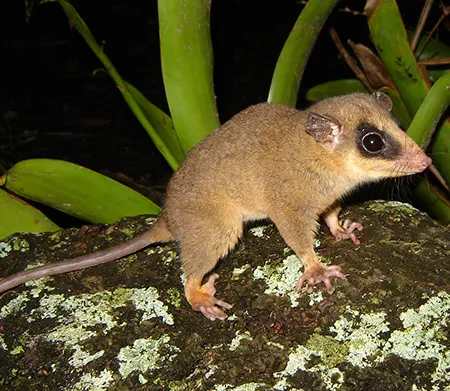
(Marmosa robinsoni)
Robinson's Mouse Opossum
Мишачий опосум Робінсона
It is found in Belize, Colombia, Ecuador, Grenada, Honduras, Panama, Peru, Trinidad and Tobago, and Venezuela.
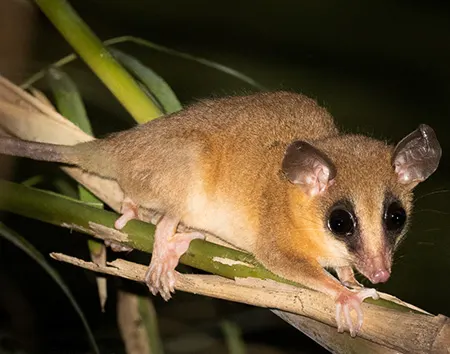
(Marmosa isthmica)
Isthmian Mouse Opossum
Істмійський мишачий опосум
It is found in Colombia, Ecuador, and Panama.
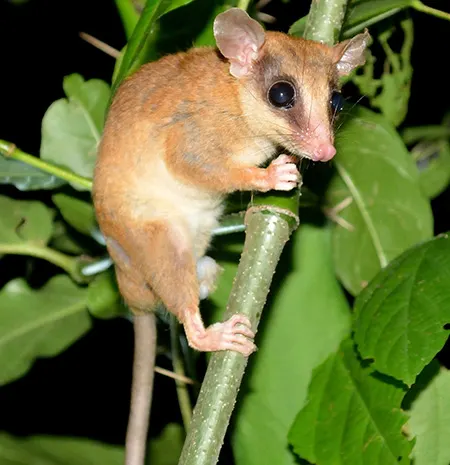
(Marmosa zeledoni)
Zeledon's Mouse Opossum
Мишачий опосум Селедона
It is found in Nicaragua, Costa Rica, Panama, and western Colombia (Nariño, Valle del Cauca).
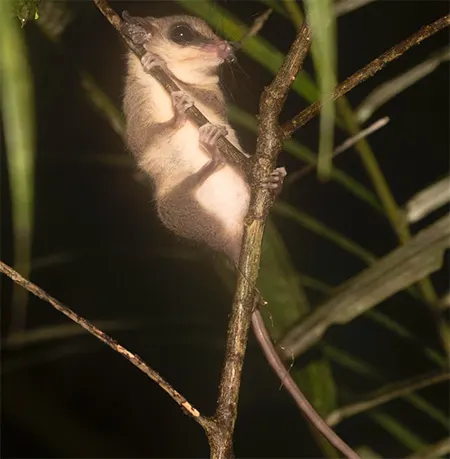
(Marmosa macrotarsus)
Quechuan Mouse Opossum
Кечуанський мишачий опосум
It was known from only two areas of montane forest on the eastern slopes of the Andes in Peru, at altitudes from 300 to 2700 m.
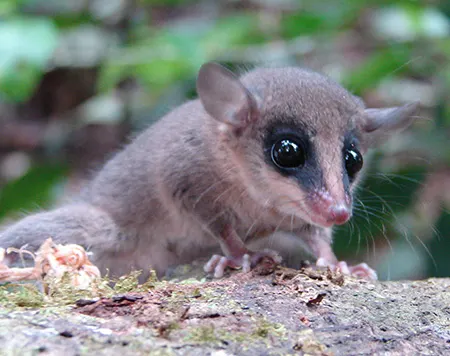
(Marmosa waterhousei)
Waterhouse's Mouse Opossum
Мишачий опосум Ватерхауса
It is found in the regions of eastern Ecuador, southeastern Colombia, northeastern Peru, and sporadically around northern Colombia and western Venezuela. It prefers moist lowland or mountainous tropical forest at altitudes of about 50–1100 m.
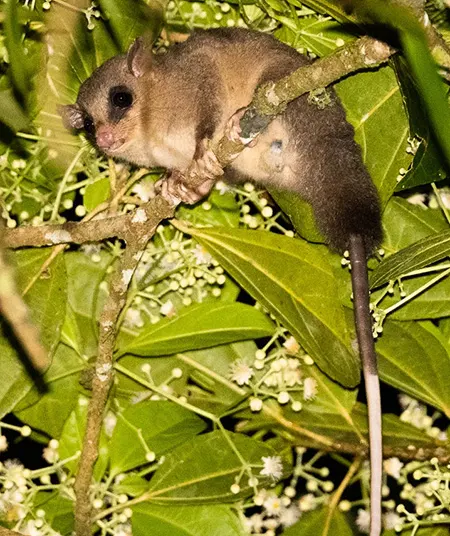
(Marmosa alstoni)
Alston's Mouse Opossum
Мишачий опосум Олстона
It is arboreal and nocturnal, inhabiting forests from Belize to northern Colombia.
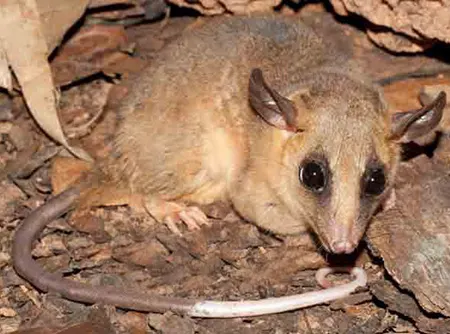
(Marmosa constantiae)
White-bellied Woolly Mouse Opossum
Білочеревий шерстистий мишачий опосум
It is found across northern Bolivia, in the Brazilian states of Mato Grosso and Mato Grosso do Sul, and in northern Argentina as far south as Tucumán Province. Across this region, it inhabits moist tropical forests, often near the boundary with drier habitats, and has been found from near sea level to montane forests as high as 1,000 m elevation.
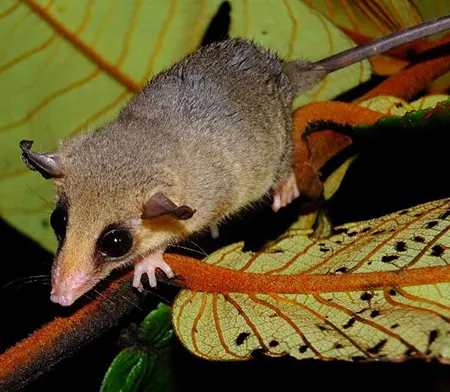
(Marmosa demerarae)
North-eastern Woolly Mouse Opossum
Північно-східний шерстистий мишачий опосум
Its range includes central Colombia, Venezuela, French Guiana, Guyana, Suriname, eastern Peru, northern Bolivia, and northern Brazil. It generally lives in tropical, humid forest below 1,200 m elevation.
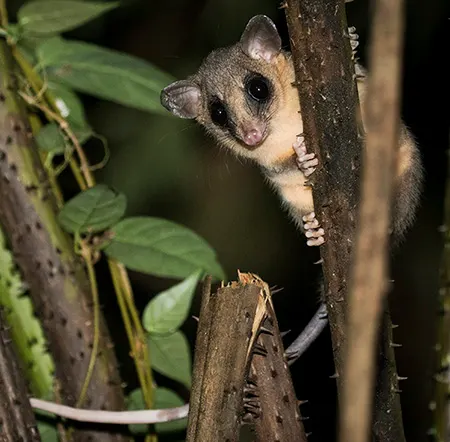
(Marmosa paraguayana)
South-eastern Woolly Mouse Opossum
Південно-східний шерстистий мишачий опосум
It is native to Atlantic coastal forests of Brazil, Paraguay and Argentina. The species lives in both primary and secondary forest, including forest fragments within grassland.
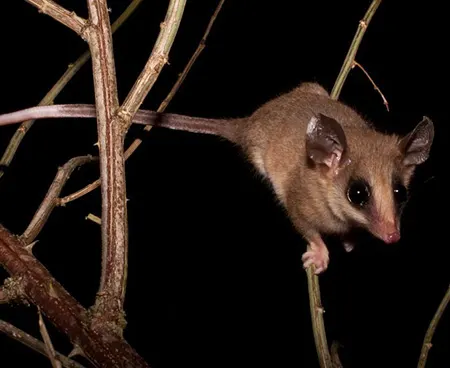
(Marmosa phaea)
Little Woolly Mouse Opossum
Малий шерстистий мишачий опосум
It is native to the western slopes of the Andes in Colombia, Ecuador and Peru, where it lives at altitudes from sea level to 1,500 m.
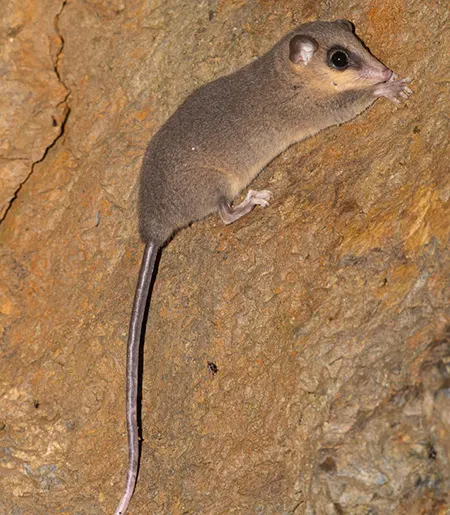
(Marmosa rapposa)
Bolivian Woolly Mouse Opossum
Болівійський шерстистий мишачий опосум
It is native to southern Peru, Bolivia, Brazil (Mato Grosso do Sul), Paraguay, and north-western Argentina.
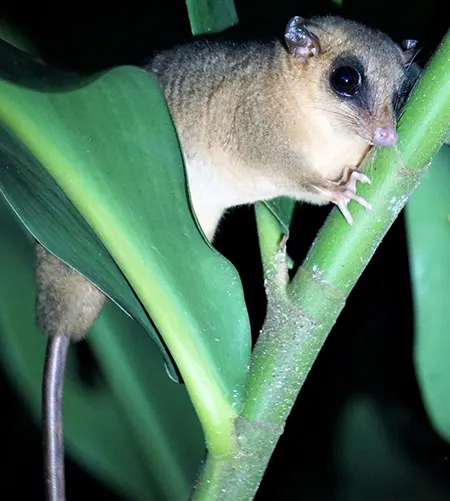
(Marmosa rutteri)
Bare-tailed Woolly Mouse Opossum
Голохвостий шерстистий мишачий опосум
It is native to southern Colombia, eastern Ecuador, Peru, and western Brazil.
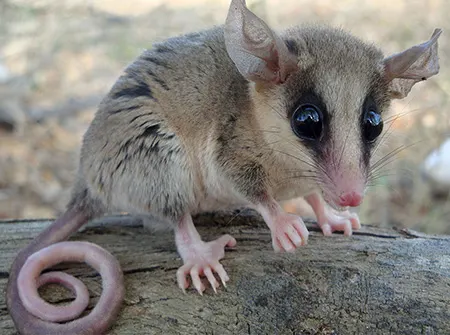
(Marmosa simonsi)
Simon's Mouse Opossum
Мишачий опосум Саймонса
It is found in western Ecuador and north-western Peru.
The genus (Marmosa) also includes: Tyler’s Mouse Opossum (Marmosa tyleriana), Adler’s Mouse Opossum (Marmosa adleri), North-western Woolly Mouse Opossum (Marmosa germana), Jansa’s Woolly Mouse Opossum (Marmosa jansae), Peruvian Woolly Mouse Opossum (Marmosa parda), Anthony’s Woolly Mouse Opossum (Marmosa perplexa), Anderson’s Mouse Opossum (Marmosa andersoni), Nicaraguan Woolly Mouse Opossum (Marmosa nicaraguae).
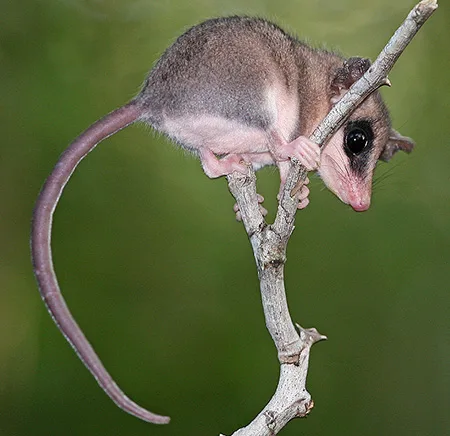
(Tlacuatzin canescens)
Grayish Mouse Opossum
Сірий мишачий опосум
It is native to Mexico, mainly from southern Sonora state, in the north, south to Oaxaca, with populations also found on the Islas Marias and in central Yucatan. It has been reported up to elevations of 2,100 m.
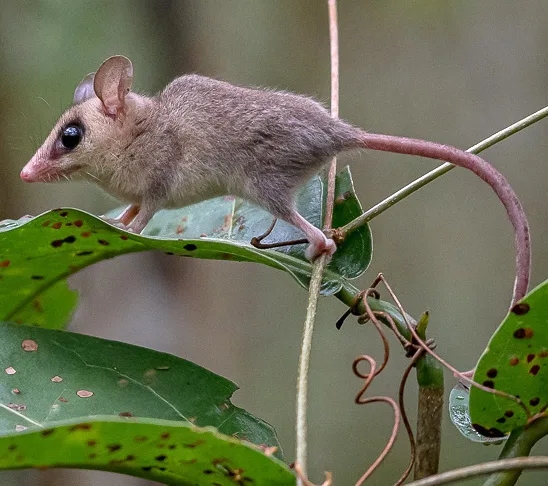
(Tlacuatzin gaumeri)
Yucatán Gray Mouse Opossum
Юкатанський сірий мишачий опосум
It is native to Mexico, specifically the Yucatan and Campeche regions.
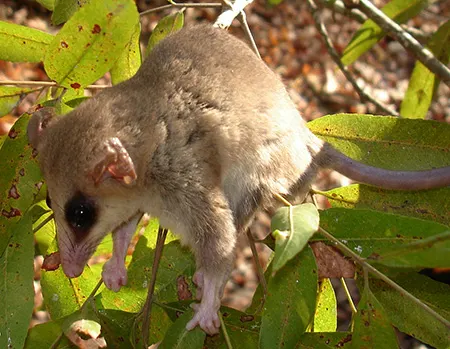
(Tlacuatzin insularis)
Tres Marías Pygmy Opossum
Трес-Маріаський сірий мишачий опосум
It is native to Mexico, specifically the Marías Islands in the state of Nayarit.
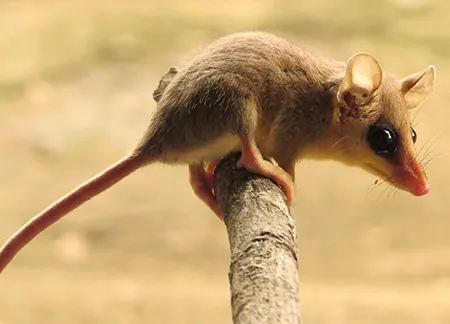
(Tlacuatzin balsasensis)
Balsas Mouse Opossum
Бальсаський мишачий опосум
It is native to Mexico, ranging from Jalisco east to Puebla and south to Oaxaca; its eastern and western limits are uncertain.
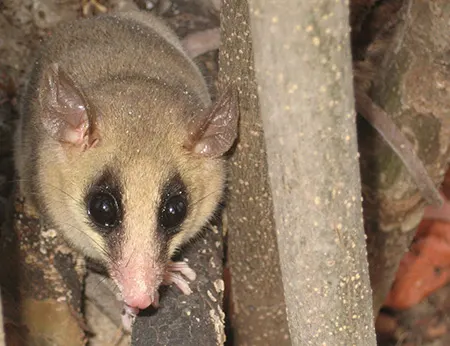
(Tlacuatzin sinaloae)
Northern Gray Mouse Opossum
Північний сірий мишачий опосум
It is native to Mexico, ranging from Sonora to Chiapas east to Zacatecas; its northern and southern limits are uncertain.
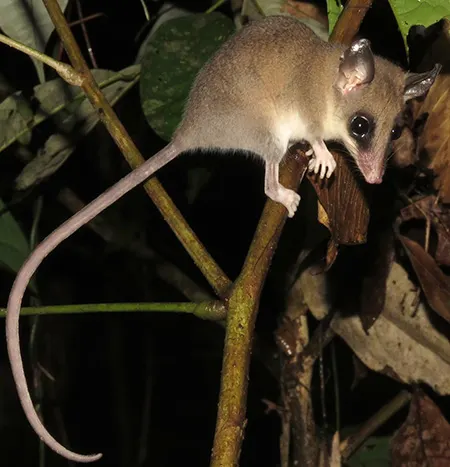
(Marmosops bishopi)
Bishop's Slender Opossum
Стрункий опосум Бішопа
It is native to Brazil, Peru, and Bolivia.
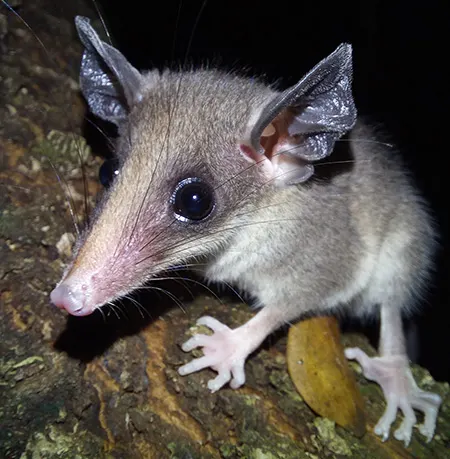
(Marmosops carri)
Carr's Slender Opossum
Стрункий опосум Карра
It is found in northern Venezuela, Trinidad and Tobago.
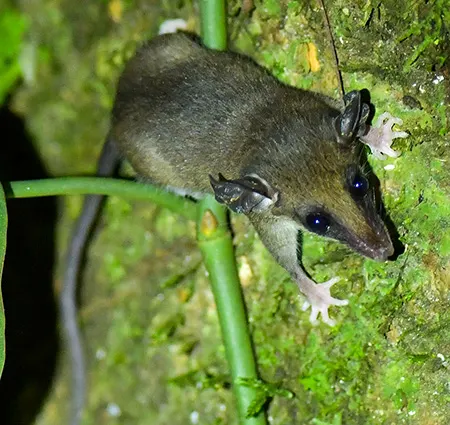
(Marmosops chucha)
Cordillera Slender Opossum
Кордильєрський стрункий опосум
It is native to Colombia, west of the Magdalena River, extending to the northern-west terminus of the Western Andes Range.
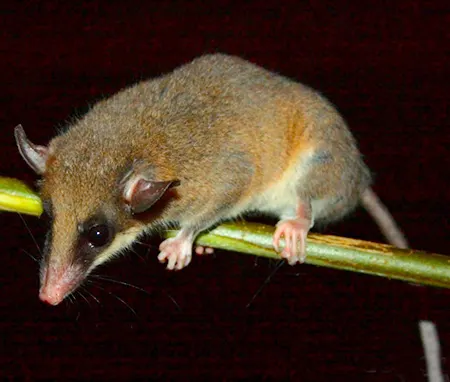
(Marmosops fuscatus)
Dusky Slender Opossum
Темний стрункий опосум
It is found in Colombia, Trinidad and Tobago, and Venezuela.
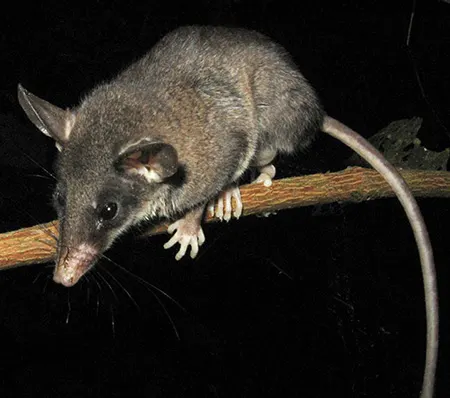
(Marmosops handleyi)
Handley's Slender Opossum
Стрункий опосум Гендлі
It is native to Colombia, specifically the Central Andes in Antioquia. It has been reported at elevations of 1,400–1,950 m.
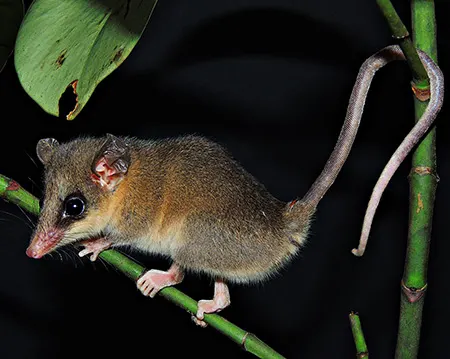
(Marmosops incanus)
Gray Slender Opossum
Сірий стрункий опосум
It is endemic to eastern Brazil and has been reported at elevations of up to 800 m.
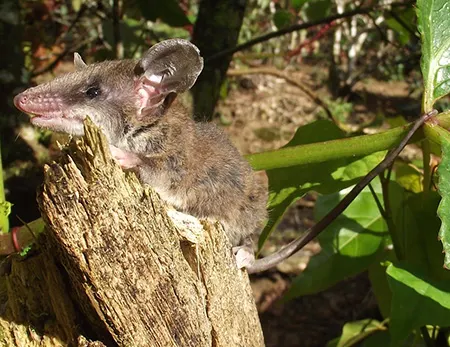
(Marmosops juninensis)
Junín Slender Opossum
Хунінський стрункий опосум
It is known only from the valley of the Chanchamayu in Peru (a range that includes Junín Region) where it lives in Andean montane forests at elevations of 1,460–2,200 m.
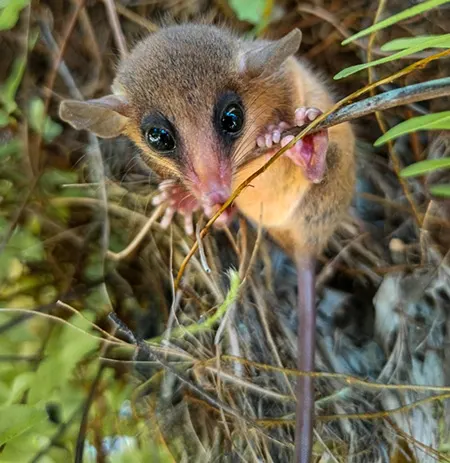
(Marmosops magdalenae)
Rio Magdalena Slender Opossum
Магдаленський стрункий опосум
It is endemic to Colombia, found from east of the Magdalena River to the western slopes of the Western Andes. It occurs at elevations of 100–1,940 m.
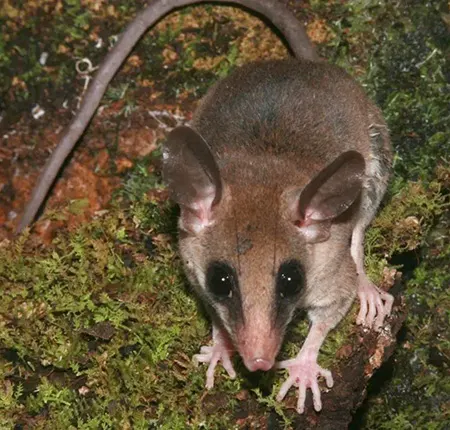
(Marmosops marina)
Silva's Slender Opossum
Стрункий опосум Сілви
It is native to Brazil, found south of the Amazon River and west of the Xingu River.
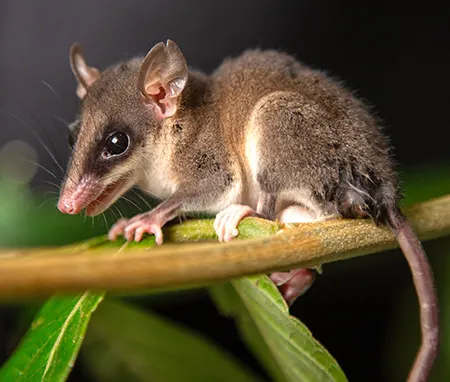
(Marmosops noctivagus)
White-bellied Slender Opossum
Білочеревий стрункий опосум
It is found in Bolivia, Brazil south of Amazon River, eastern Ecuador and Peru. It occurs at elevations 300–1,500 m.
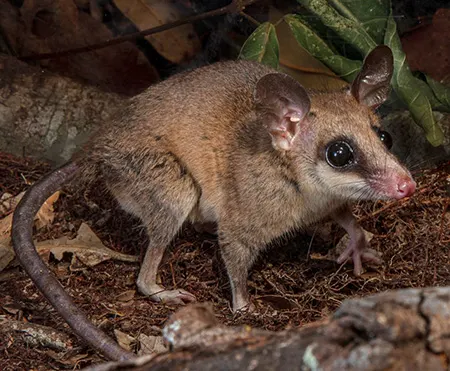
(Marmosops ocellatus)
Spectacled Slender Opossum
Очковий стрункий опосум
It inhabits Chiquitania dry forest, a transitional zone between the Cerrado savannah and Amazon rainforest in central and eastern Bolivia and western Brazil.
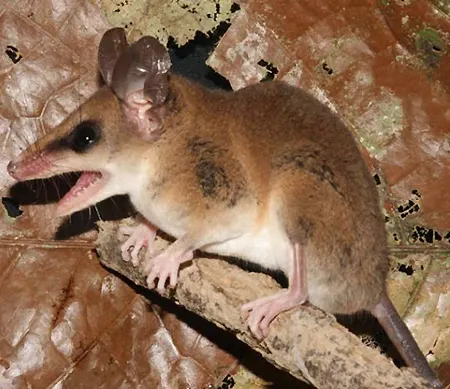
(Marmosops parvidens)
Delicate Slender Opossum
Делікатний стрункий опосум
It occurs in French Guiana, Guyana, Suriname, and adjacent Venezuela and Brazil. It is found in moist primary tropical rainforest at elevations up to 2,000 m.
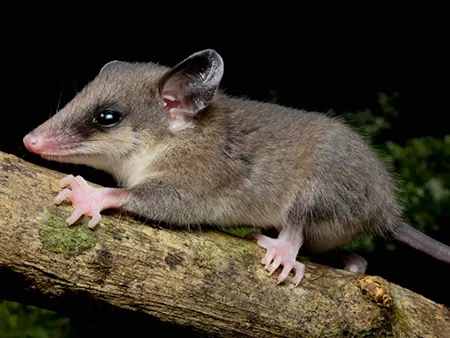
(Marmosops paulensis)
Brazilian Slender Opossum
Бразильський стрункий опосум
It is found in moist montane forest in the Atlantic Forest region of southeastern Brazil, including the states of Minas Gerais, Rio de Janeiro, São Paulo and Paraná. It occurs at elevations above 800 m.
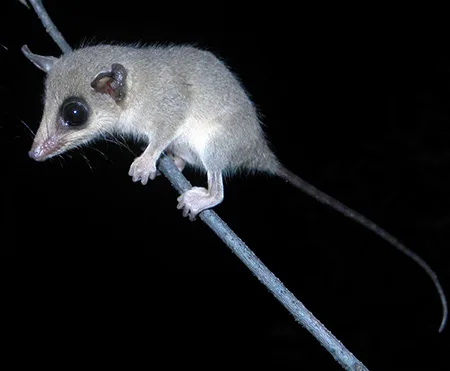
(Marmosops pinheiroi)
Pinheiro's Slender Opossum
Стрункий опосум Пінейро
It is found in northern Brazil, French Guiana, Guyana, Suriname and south-eastern Venezuela. It occurs at elevations of 0–500 m.
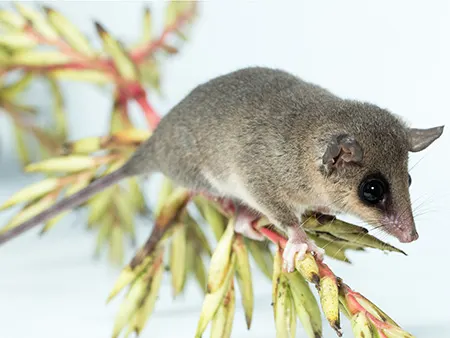
(Marmosops caucae)
Tschudi's Slender Opossum
Стрункий опосум Тшуді
It is found in Bolivia, Brazil, Colombia, Ecuador, Paraguay, Peru and Venezuela.
The genus (Marmosops) also includes: Creighton’s Slender Opossum (Marmosops creightoni), Panama Slender Opossum (Marmosops invictus), Ojasti’s Slender Opossum (Marmosops ojastii), Pantepui Slender Opossum (Marmosops pakaraimae), Soini’s Slender Opossom (Marmosops soinii), Woodall’s Slender Opossum (Marmosops woodalli).
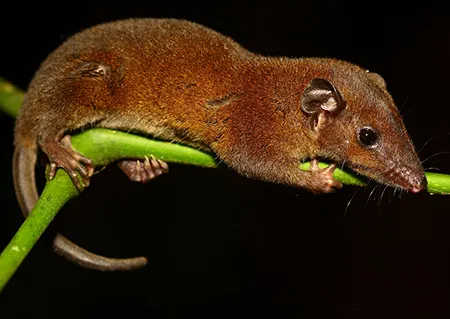
(Monodelphis adusta)
Sepia Short-tailed Opossum
Сепієвий короткохвостий опосум
It is found in Colombia, eastern Ecuador, eastern Panama, northern Peru, and south-eastern Venezuela. It is habitat consists of different types of forests at elevations up to 2,200 m.
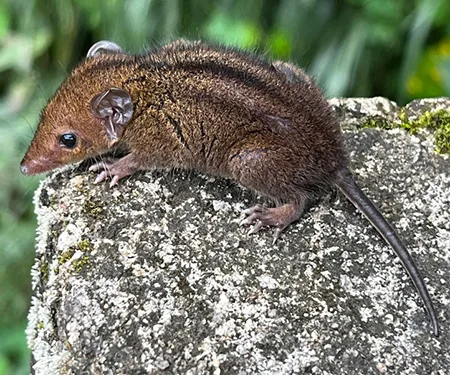
(Monodelphis americana)
Northern Three-striped Opossum
Північний трисмугий опосум
It is endemic to Atlantic Forest ecoregions of coastal Brazil.
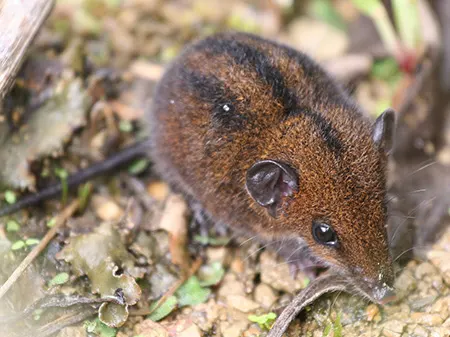
(Monodelphis gardneri)
Gardner's Short-tailed Opposum
Короткохвостий опосум Гарднера
It inhabits the montane forests on the eastern slopes of the Andes Mountains in Peru.
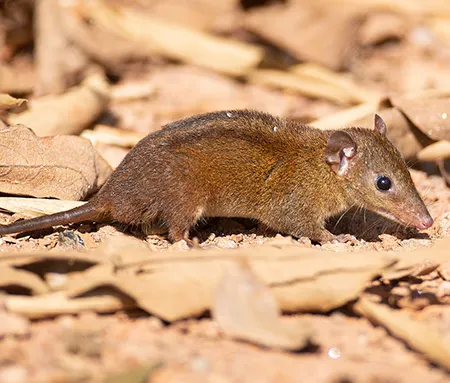
(Monodelphis iheringi)
Ihering's Three-striped Opossum
Трисмугий опосум Ігерінга
It is found in Brazil, from the coastal Espírito Santo to Rio Grande do Sul.
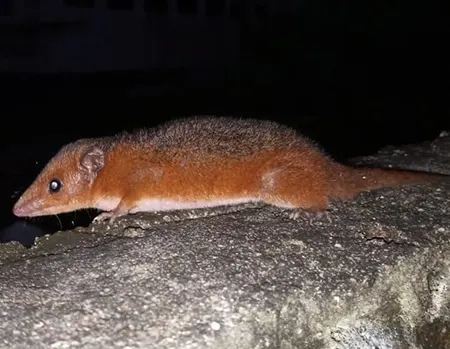
(Monodelphis arlindoi)
Arlindo's Short-tailed Opossum
Короткохвостий опосум Арлінду
It is found in central and southern Guyana, and in Brazil north of the Amazon River.
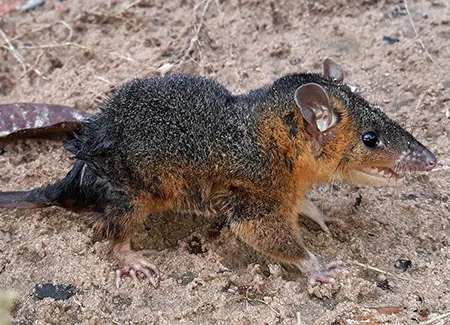
(Monodelphis glirina)
Amazonian Red-sided Opossum
Амазонський червонобокий опосум
It is found in Bolivia, Brazil and Peru, where it inhabits the Amazon rainforest.
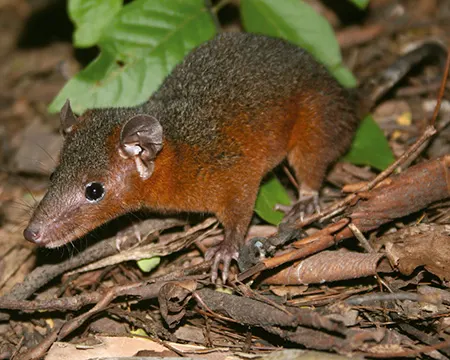
(Monodelphis palliolata)
Hooded Red-sided Opossum
Капюшоновий червонобокий опосум
It is found in north-eastern Colombia and north-western Venezuela at altitudes from sea level to 2,250 m.
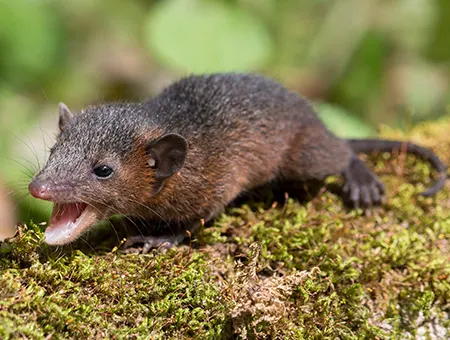
(Monodelphis brevicaudata)
Northern Red-sided Opossum
Північний червонобокий опосум
It is found in Bolivia, Brazil. French Guiana, Guyana, Suriname and Venezuela. It occurs at elevations 95–1,080 m.
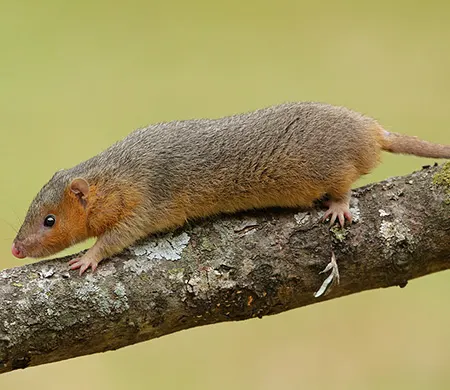
(Monodelphis dimidiata)
Yellow-sided Opossum
Жовтобокий опосум
It is found in south-eastern Brazil, southern Paraguay, northern and eastern Argentina, and Uruguay.
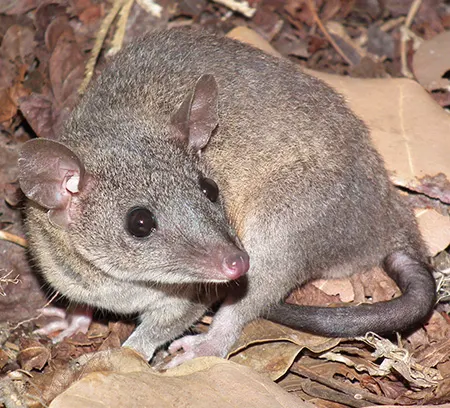
(Monodelphis domestica)
Gray Short-tailed Opossum
Сірий короткохвостий опосум
It is found generally south of the Amazon River, in southern, central, and western Brazil. It is also found in eastern Bolivia, northern Paraguay, and in Formosa Province in northern Argentina.
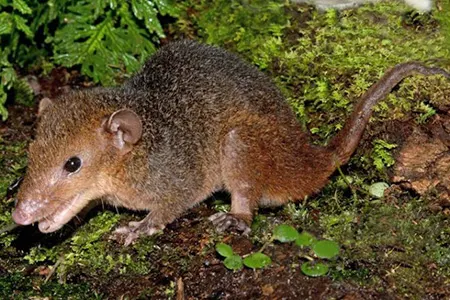
(Monodelphis emiliae)
Emilia's Short-tailed Opossum
Короткохвостий опосум Емілії
It is found south of the Amazon River from eastern Peru, through Bolivia, to central Brazil.
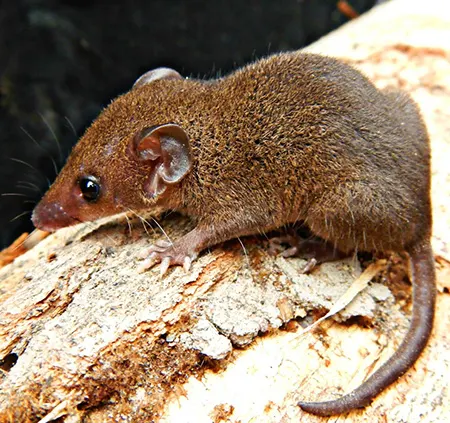
(Monodelphis kunsi)
Pygmy Short-tailed Opossum
Карликовий короткохвостий опосум
It is found in northern Argentina, Bolivia, south-central Brazil, and northern Paraguay. It occurs at elevations of 200–1,700 m.
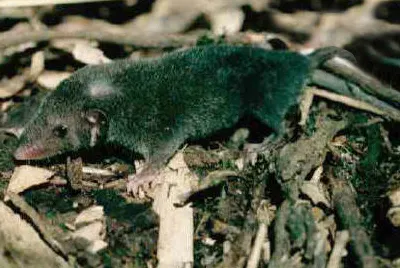
(Monodelphis osgoodi)
Osgood's Short-tailed Opossum
Короткохвостий опосум Осґуда
It is found on the eastern slopes of the Andes in western Bolivia and south-eastern Peru. It occurs at elevations of 1,900–3,200 m.
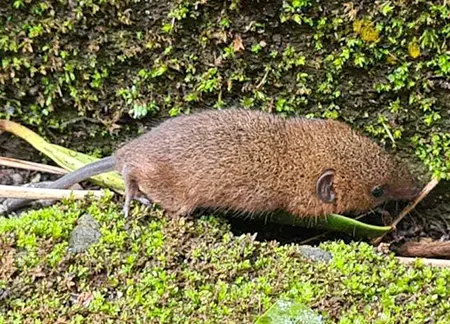
(Monodelphis pinocchio)
Long-nosed Short-tailed Opossum
Довгоносий короткохвостий опосум
It is found in south-eastern Brazil, in the Atlantic Forest, from Espírito Santo and Minas Gerais to São Paulo.
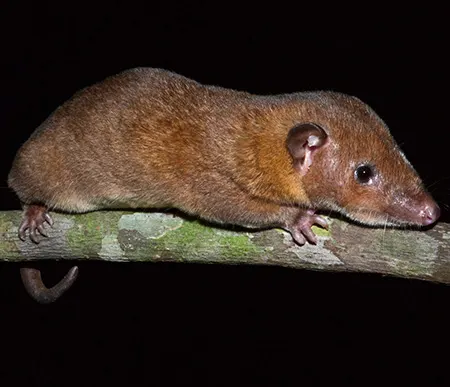
(Monodelphis ronaldi)
Ronald's Opossum
Опосум Рональда
It is known only from Manú National Park, Peru, where it inhabits the Amazon rainforest.
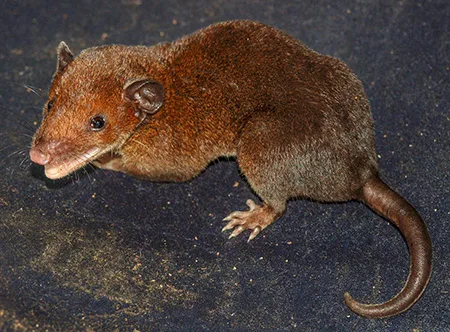
(Monodelphis saci)
Saci Short-tailed Opossum
Короткохвостий опосум Сакі
It lives in the lowland rainforests along the south bank of the Brazilian Amazon.
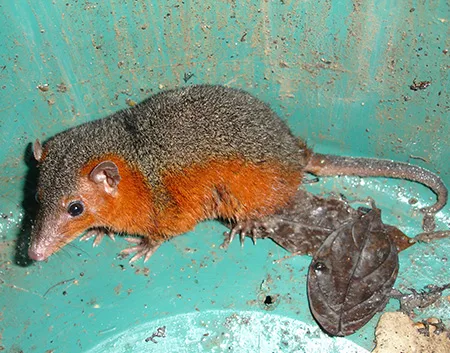
(Monodelphis touan)
Touan Short-tailed Opossum
It is found in French Guiana and northern Brazil.
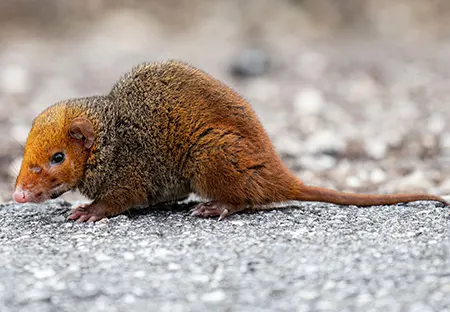
(Monodelphis scalops)
Tawny-headed Opossum
Червоноголовий опосум
It is found in north-eastern Argentina and south-eastern Brazil, from Espírito Santo to Santa Catarina. It occurs at elevations below 1,080 m.
The genus (Monodelphis) also includes: Handley’s Short-tailed Opossum (Monodelphis handleyi), Peruvian Short-tailed Opossum (Monodelphis peruviana), Reig’s Opossum (Monodelphis reigi), Santa Rosa Short-tailed Opossum (Monodelphis sanctaerosae), One-striped Opossum (Monodelphis unistriata), Voss’s Short-tailed Opossum (Monodelphis vossi).
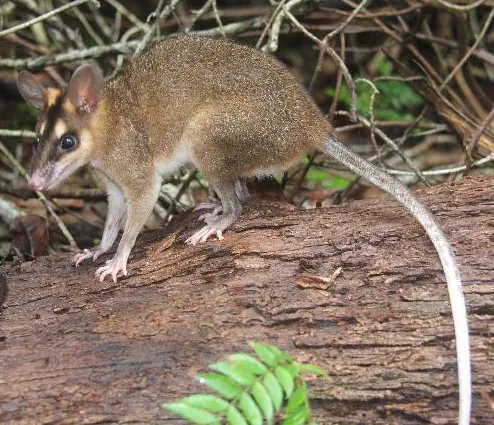
(Metachirus nudicaudatus)
Guianan Brown Four-eyed Opossum
Гаянський бурий чотириокий опосум
It is found in various forested habitats in Guyana, Suriname, French Guiana, and northern Brazil.
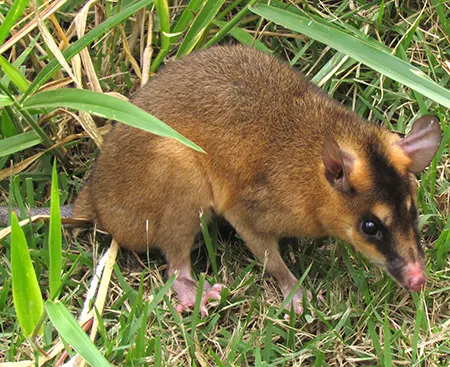
(Metachirus myosuros)
Common Brown Four-eyed Opossum
Звичайний бурий чотириокий опосум
It is found in southern Mexico and from southern Nicaragua to Venezuela, Brazil, Bolivia, Paraguay, and northern Argentina. It occurs at elevations of 0–2,100 m.
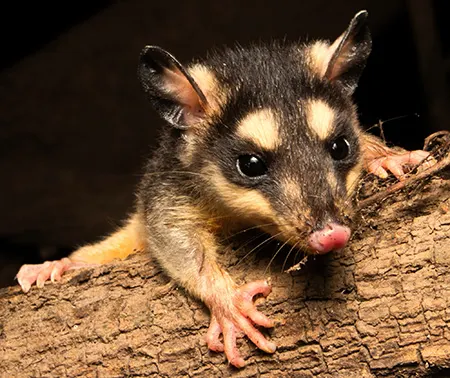
(Philander canus)
Common Four-eyed Opossum
Звичайний чотириокий опосум
It is found in the Eastern Andes of Argentina, Paraguay, Bolivia, Brazil, Peru, Colombia, and Venezuela.
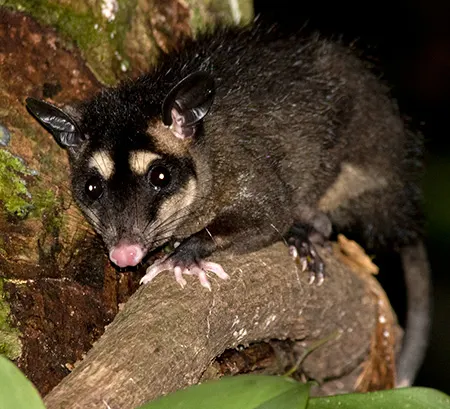
(Philander mcilhennyi)
McIlhenny's Four-eyed Opossum
Чотириокий опосум Макілгенні
It is found in western Brazil and east-central Peru.
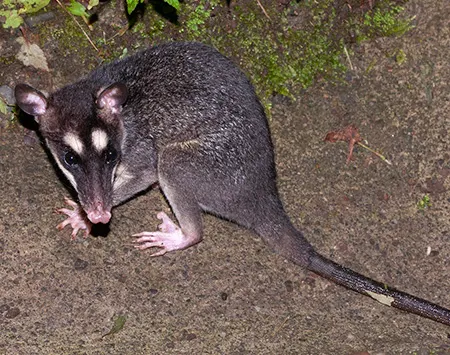
(Philander melanurus)
Dark Four-eyed Opossum
Темний чотириокий опосум
It is found in Panama, the Pacific lowlands of Colombia, and eastern Ecuador.
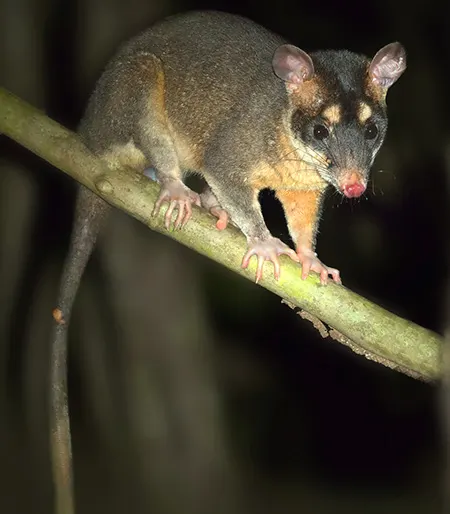
(Philander opossum)
Gray Four-eyed Opossum
Сірий чотириокий опосум
It is found in Guyana, Suriname, French Guiana, and northern Brazil, at altitudes from sea level to 1,600 m.
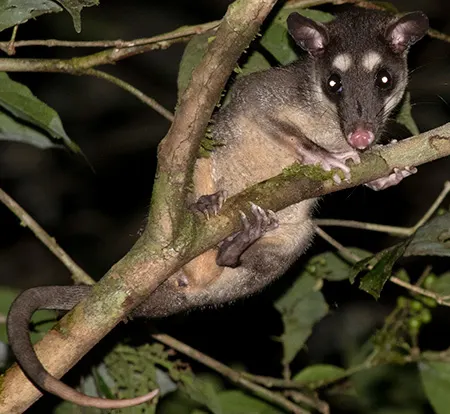
(Philander pebas)
Pebas Four-eyed Opossum
Пебаський чотириокий опосум
It is known from Brazil (Acre, Amazonas, and Pará), eastern Peru, and eastern Ecuador.
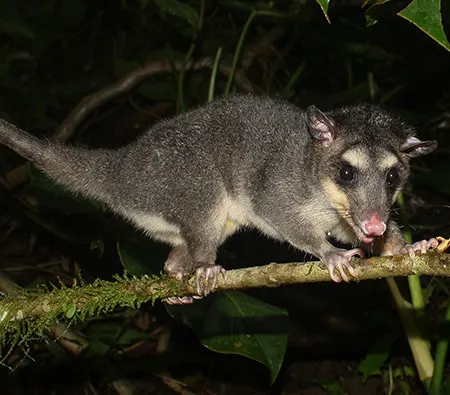
(Philander quica)
Southern Four-eyed Opossum
Південний чотириокий опосум
It is found in southern Brazil, north-eastern Argentina, and eastern Paraguay.
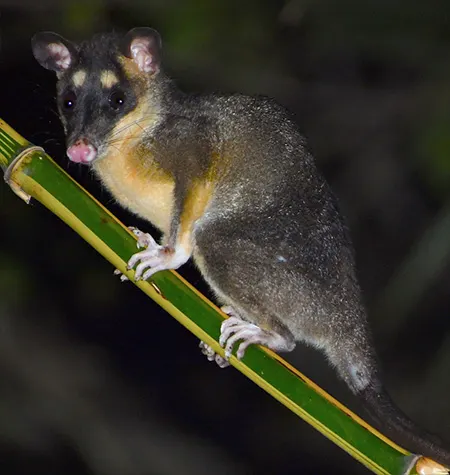
(Philander vossi)
Northern Four-eyed Opossum
Північний чотириокий опосум
It is found in Belize, El Salvador, and southern Mexico.
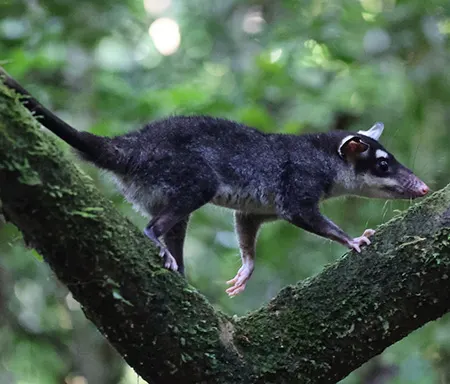
(Philander andersoni)
Anderson's Four-eyed Opossum
Чотириокий опосум Андерсона
It is found in Brazil, south-eastern Colombia, eastern Ecuador, northern and southern Peru, and south-central Venezuela.
The genus (Philander) also includes: Deltaic Four-eyed Opossum (Philander deltae), Black Four-eyed Opossum (Philander nigratus).
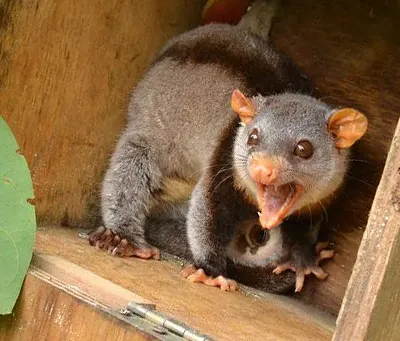
(Caluromysiops irrupta)
Black-shouldered Opossum
Чорноплечий опосум
It occurs in humid forests of western Brazil and south-eastern Peru, and probably in northern Bolivia.
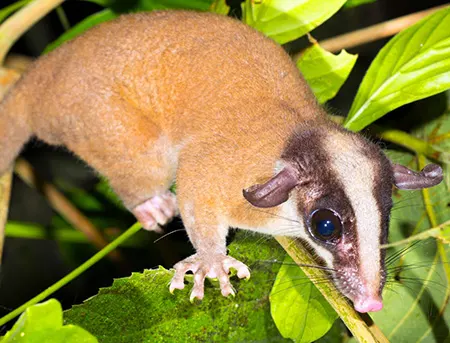
(Glironia venusta)
Bushy-tailed Opossum
Пухнастохвостий опосум
It is found in northern Bolivia, southern Colombia, eastern Ecuador, eastern Peru, and Brazil (southern Amazonas, Pará, southern Mato Grosso). It occurs at elevations of up to 5,000 m.
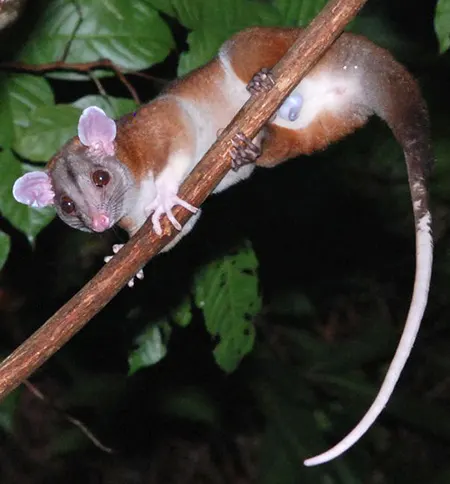
(Caluromys derbianus)
Derby's Woolly Opossum
Шерстистий опосум Дербі
It is found from southern Mexico to western Ecuador and Colombia, at altitudes ranging from sea level to 2,600 m.
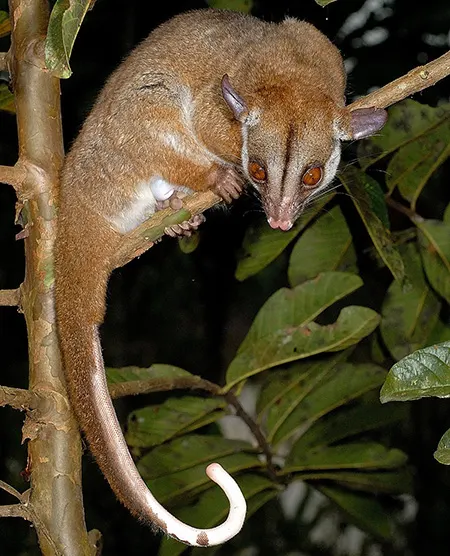
(Caluromys lanatus)
Brown-eared Woolly Opossum
Буровухий шерстистий опосум
The range lies to the east of the Andes – from Bolivia, central Colombia, eastern Ecuador, Peru and western and southern Venezuela to northeastern Argentina, western, central and southern Brazil, eastern and southern Paraguay. It occurs at elevations of up to 500 m.
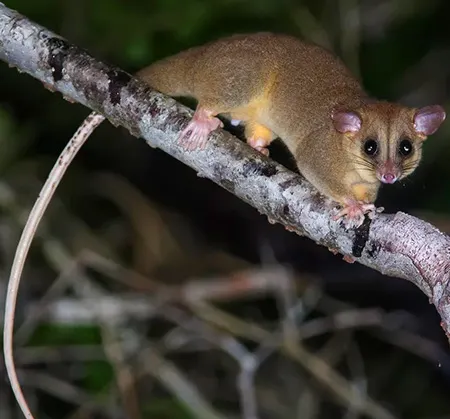
(Caluromys philander)
Bare-tailed Woolly Opossum
Голохвостий шерстистий опосум
It is found from northern Venezuela eastward to northeastern and south-central Brazil, including Guyana, French Guiana, Suriname, Margarita Island, and Trinidad. It occurs at elevations of 1,200–1,800 m.
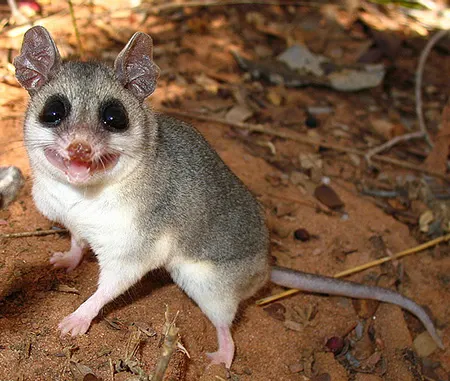
(Thylamys karimii)
Karimi's Fat-tailed Mouse Opossum
Товстохвостий опосум Карімі
It is endemic to central and north-eastern Brazil, where it is found in the cerrado and caatinga at elevations from 300 to 1,100 m.
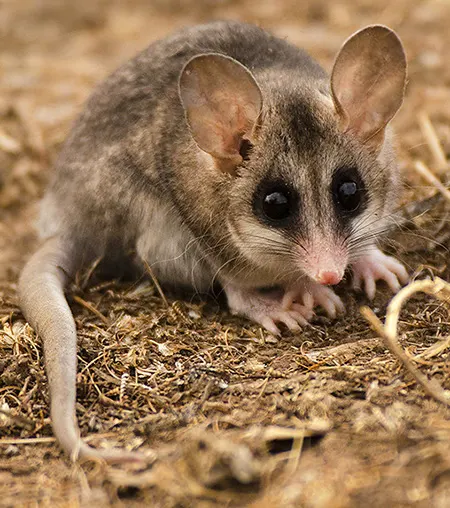
(Thylamys elegans)
Elegant Fat-tailed Mouse Opossum
It is endemic to central Chile, found at elevations ranging from sea level to 1,000 m.
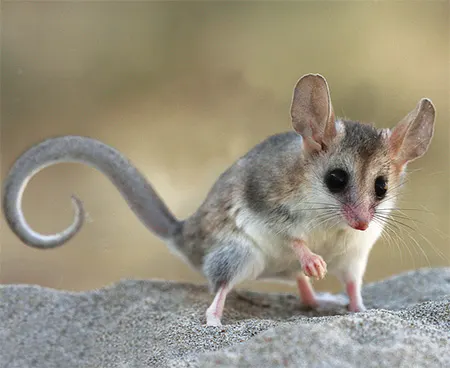
(Thylamys pallidior)
White-bellied Fat-tailed Mouse Opossum
Білочеревий товстохвостий опосум
It is found in southern Peru and south-western Bolivia, in the northernmost regions of Chile, and along the eastern slopes of the Andes mountains in western and central Argentina. It occurs at elevations of up to 4,500 m.
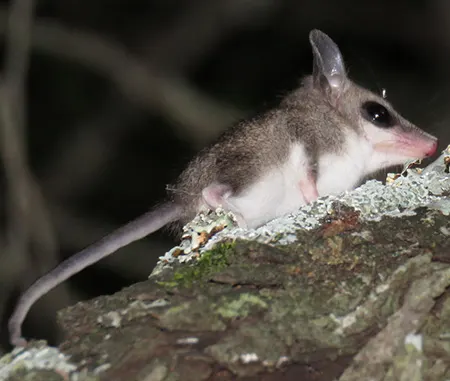
(Thylamys pulchellus)
Chaco Fat-tailed Mouse Opossum
Чакський товстохвостий опосум
It is endemic to the Argentine portion of Gran Chaco.
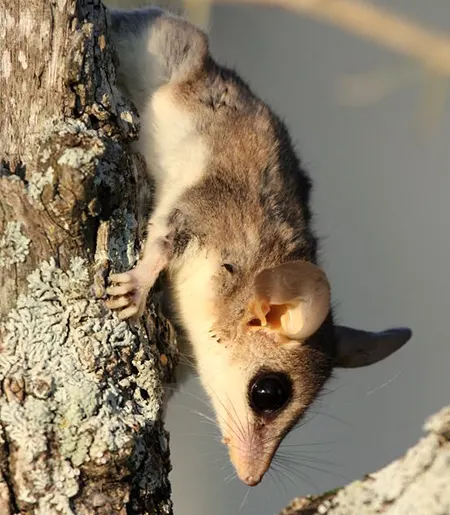
(Thylamys pusillus)
Common Fat-tailed Mouse Opossum
Звичайний товстохвостий опосум
It is found in Argentina, Bolivia, and Paraguay, in chaco and Andean foothill habitats.
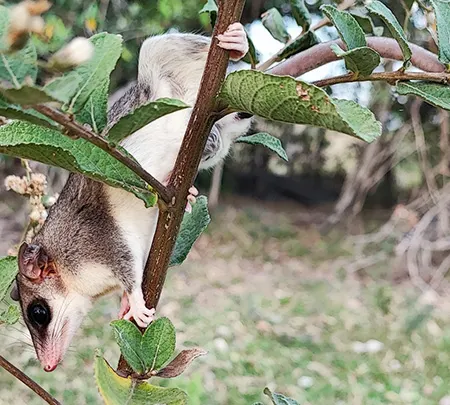
(Thylamys macrurus)
Paraguayan Fat-tailed Mouse Opossum
Парагвайський товстохвостий опосум
It is found in forested areas of southern Brazil and eastern Paraguay.
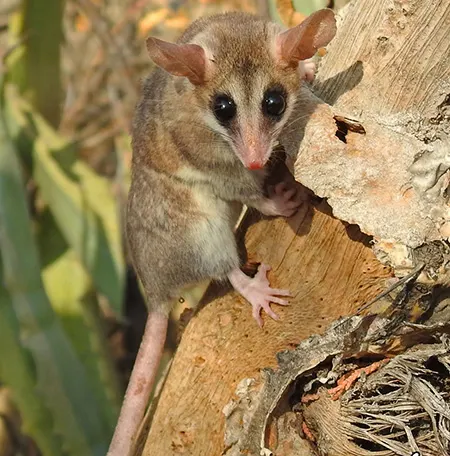
(Thylamys venustus)
Buff-bellied Fat-tailed Mouse Oppossum
It is found in the transitional and humid forests of northern Argentina and southern Bolivia. It occurs at elevations of 250–4,000 m.
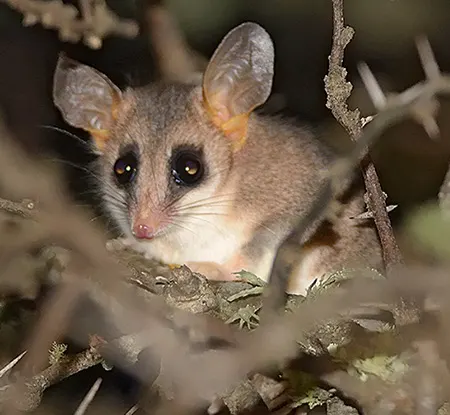
(Thylamys citellus)
Mesopotamian Fat-tailed Mouse Opossum
Месопотамський товстохвостий опосум
It is found in northeastern Argentina (Entre Ríos and Corrientes, south of the Ibera Wetlands).
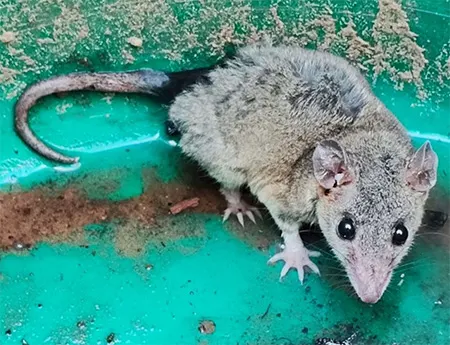
(Thylamys velutinus)
Dwarf Fat-tailed Mouse Opossum
Карликовий товстохвостий опосум
It is found in south-central and south-eastern Brazil (Goiás, Minas Gerais, and São Paulo).
The genus (Thylamys) also includes: Tate’s Fat-tailed Mouse Opossum (Thylamys tatei), Argentine Fat-tailed Mouse Opossum (Thylamys sponsorius).

